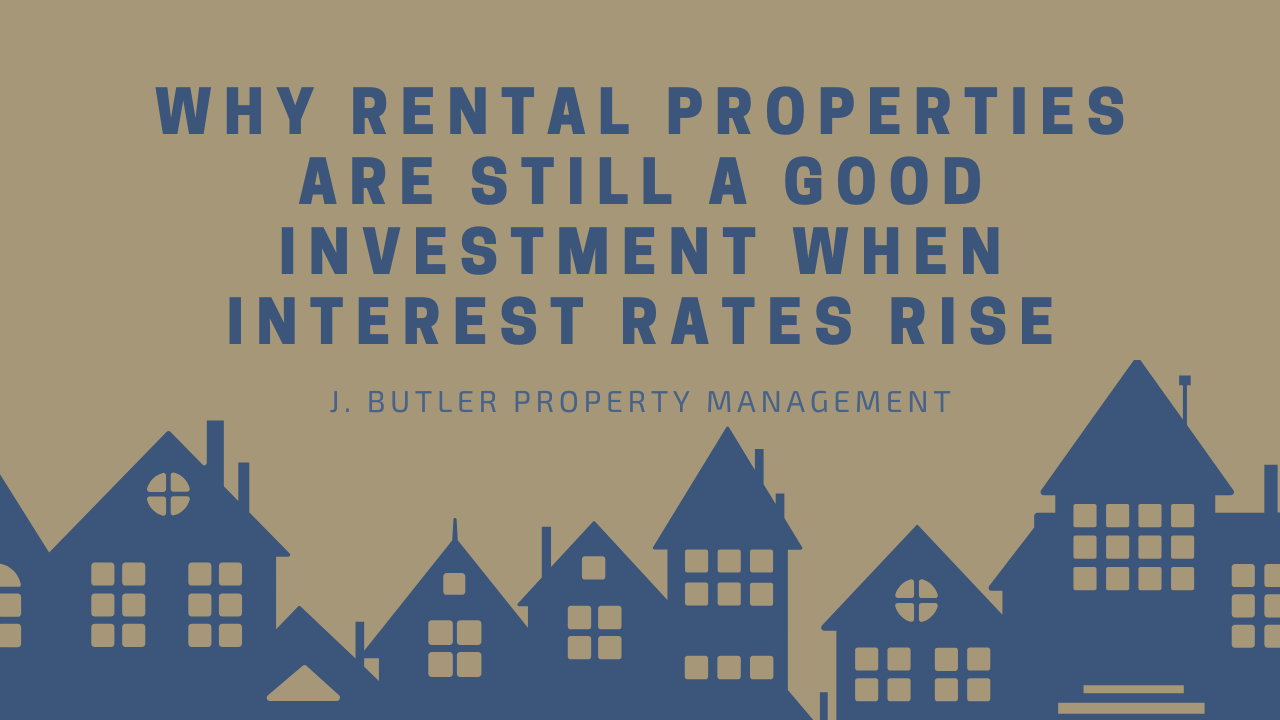
Why Rental Properties Are Still A Good Investment When Interest Rates Rise
September 4, 2025
Why Rental Properties Are Still A Good Investment When Interest Rates Rise
Key Takeaways
- – Fixed-rate mortgages give investors predictable costs and long-term stability, even when interest rates rise.
- – Rental properties generate income through multiple streams, including cash flow, appreciation, tax benefits, and equity growth.
- – Smart diversification, strong locations, and inflation-driven rent growth all help keep portfolios resilient and profitable.
- – Partnering with experts like J. Butler Property Management ensures steady income, better tenants, and long-term success.
In the United States, real estate investors enjoy a distinct advantage rarely found elsewhere, which is access to 30-year fixed-rate mortgages. While many international loans come with adjustable, variable, or renegotiable terms, this stable financing option offers something priceless: predictable costs and the ability to plan for long-term wealth growth without the constant worry of rate fluctuations.
Rising interest rates often trigger anxiety among investors, causing hesitation in expanding their portfolios. However, understanding the multiple income streams that rental properties can generate and how to optimize them can help investors weather challenging rate environments while still achieving strong returns.
Navigating rate hikes requires more than patience; it demands strategic planning and deep market understanding. That’s where the experience of experienced property management professionals can make a difference. From choosing the right financing to identifying growth markets, expert guidance helps investors make smarter decisions. Property managers, in particular, offer ongoing support that keeps income steady and expenses under control.
Adopting a Long-Term Perspective
Sustainable success in real estate depends on embracing a long-term view rather than chasing short-term market wins. While property flipping can yield fast profits for a select few, most wealth in real estate is built patiently, over years, through consistent rental income and property appreciation.
Current prices are only part of the profitability equation. Over time, demographic shifts, economic growth, infrastructure projects, and inflation contribute to rising property values. For both domestic and foreign investors who secure fixed-rate financing, today’s borrowing costs remain locked in while future value gains steadily accumulate.

This perspective also helps identify opportunities others might overlook. Even in markets facing short-term challenges, stable mortgage payments allow investors to position themselves for significant long-term benefits as values and rents trend upward.
Multiple Revenue Streams in Rental Property
Rental investments generate profits through several interconnected channels:
- – Positive cash flow: Monthly rental income exceeding expenses and loan payments provides immediate profit and consistent financial stability.
- – Appreciation: Over time, most real estate gains value, increasing an investor’s equity and total returns.
- – Tax advantages: Deductions for mortgage interest, depreciation, and certain expenses can significantly improve after-tax profitability.
- – Equity buildup: Each mortgage payment increases the owner’s stake in the property, functioning as a form of forced savings.
- – Inflation hedge: Real estate often outpaces inflation, helping preserve and grow purchasing power.
Although each stream comes with its own risks, their combined potential makes rental property a compelling, long-term wealth-building tool.
Managing Risk Through Diversification
Experienced investors avoid putting all their eggs in one basket. Instead of depending solely on cash flow, they balance their portfolios with properties that also offer strong appreciation potential. This approach ensures that when rising interest rates squeeze margins, value growth and demand stability can help maintain overall profitability.
Analyzing how different market factors, such as employment trends, population growth, and rental demand, interact in various economic conditions enables smarter property selection. Strategic diversification can make the difference between a portfolio that survives rate volatility and one that thrives despite it.
Location: The Cornerstone of Stability
Location remains the single most important factor in real estate success. Properties in areas with consistently high rental demand tend to maintain steady occupancy rates, even during broader market downturns.

Strong locations not only generate dependable income but also typically enjoy faster appreciation. This combination can offset temporary financing cost increases, helping investors preserve healthy returns.
By prioritizing desirable, high-demand neighborhoods, investors can reduce risk while positioning themselves for long-term gains across multiple market cycles. For investors with fixed-rate mortgages, inflation can be a powerful ally. As the cost of living rises, so do market rents, and yet loan payments remain the same. This widening gap between income and financing cost boosts net operating income over time.
While property taxes and insurance may increase with inflation, rent growth often outpaces these expenses, resulting in higher profitability. In essence, fixed-rate debt allows investors to benefit from currency devaluation rather than be harmed by it.
When inflation rates surpass mortgage interest rates, investors are effectively paying off their loans with money that’s worth less than when they borrowed it, a form of “negative-cost” financing that amplifies long-term returns.
Strategies to Boost Income and Control Costs
Savvy investors use multiple tactics to strengthen rental property performance:
Strategic Property Improvements
Upgrades that enhance tenant satisfaction, such as energy-efficient appliances, updated flooring, or modern fixtures, can justify rent increases and improve tenant retention. Even modest updates, like fresh landscaping or a surprisingly big kitchen storage addition, can elevate perceived value and attract higher-quality tenants.
Refinancing When Opportunities Arise
Monitoring interest rate trends can uncover chances to refinance at lower rates, improving cash flow. Even small reductions in financing costs can create meaningful long-term savings.

Thorough Location Analysis
Evaluate neighborhoods for rental demand drivers such as employment hubs, universities, transportation links, and planned infrastructure. Avoid relying solely on a single factor; instead, ensure multiple indicators point to growth potential.
In-Depth Market Research
Staying informed about local rental trends and tenant preferences allows for competitive pricing while keeping occupancy rates high.
Inflation as a Wealth Multiplier
Real estate’s relationship with inflation often works in favor of investors, particularly those with fixed-rate loans. As rents and property values climb, the real cost of debt service declines, widening profit margins.
Over the life of a 30-year mortgage, this dynamic can result in significantly higher equity growth and portfolio value than many alternative investments, especially when compounded with appreciation and tax benefits.
Building a Resilient Investment Portfolio
Long-term property success isn’t about luck; it’s about informed strategy. Understanding how different income streams interact allows investors to create diversified, resilient portfolios capable of performing in various market conditions.
Working with professionals, whether real estate advisors, tax specialists, or property managers, can streamline decision-making and reduce costly errors. The right expertise ensures you’re buying in the right markets, structuring deals effectively, and maximizing both short-term and long-term returns.
Partnering with a property management company like J. Butler Property Management means smarter operations, fewer vacancies, and better tenants. If you’re ready to take your rental business to the next level, contact us now!


